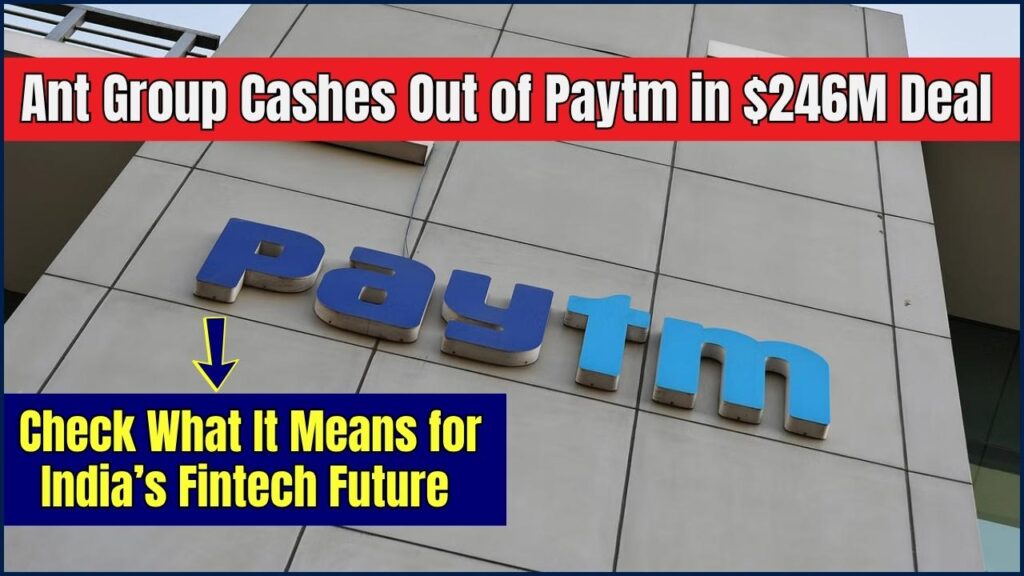Ant Group Cashes Out of Paytm in $246M Deal: In a major shake-up that’s sending ripples through India’s rapidly evolving fintech ecosystem, Ant Group has officially exited Paytm, selling off a significant 4.1% stake valued at $246 million (approximately ₹2,200 crore). This stake sale not only marks the end of a notable chapter in cross-border tech investment but also underscores a major shift in how India is positioning itself as a self-reliant digital economy. For observers both casual and professional, this isn’t just a money move—it’s a story about geopolitics, policy shifts, and a new era for Indian startups.

The block deal, executed on May 13, 2025, was managed through a strategic offering at ₹823.10 per share—roughly 5% below Paytm’s last closing price of ₹866.05. With Goldman Sachs and Citigroup acting as the facilitators, this isn’t your average trade. It’s a calculated divestment that sets the stage for what’s coming next in India’s fintech race.
Ant Group Cashes Out of Paytm in $246M Deal
| Key Point | Details |
|---|---|
| Deal Date | May 13, 2025 |
| Stake Sold | 4.1% of One97 Communications (Paytm’s parent) |
| Deal Value | $246 million (₹2,200 crore) |
| Share Price | ₹823.10 per share (5% discount) |
| Market Impact | Paytm stock dropped ~5% post-deal |
| Facilitated By | Goldman Sachs, Citigroup |
| Reason | Geopolitical tensions, Indian FDI restrictions |
| Official Source | Reuters |
Ant Group’s $246 million sale of its remaining Paytm shares is more than just a cash-out—it’s a symbol of shifting tectonic plates in the world of digital finance. For India, this represents a push toward economic self-reliance, policy clarity, and geopolitical recalibration. For Paytm, it offers the space to rebrand, rebuild, and realign with its long-term mission. One thing’s clear: the Indian fintech future is local, bold, and just getting started.
What Sparked the Exit?
Let’s call it like it is—this was a geopolitical breakup wrapped in a business transaction. Ant Group, the powerhouse fintech arm of China’s Alibaba Group, has been scaling down its India exposure for some time now. This 2025 sale follows a 2023 deal where Ant sold 10.3% of its Paytm holdings to the company’s founder and CEO, Vijay Shekhar Sharma, signaling the beginning of its slow retreat.
So, what led to this full exit?
- India-China tensions continue to flare, triggering policy restrictions.
- India revised FDI (Foreign Direct Investment) norms, adding barriers to investments from neighboring countries.
- National security considerations led to scrutiny of Chinese stakes in Indian tech platforms.
- Global investors, including Ant, are restructuring their portfolios to mitigate country-specific risks.
Put simply, the environment turned cold, and Ant decided to exit before things got colder.
Flashback: Ant’s Investment Timeline with Paytm
Ant Group first threw its hat into the Paytm ring in 2015, at a time when India’s digital payments landscape was taking baby steps. Riding the post-demonetization wave and the UPI revolution, Paytm ballooned into a household name. At one point, Ant Group held around 23.8% of Paytm’s parent company, One97 Communications.
However, over the last two years, that relationship has deteriorated under pressure. It started with regulatory chills in China, then came geopolitical headwinds in India, and eventually, a clear business imperative emerged: Ant needed to de-risk.
Strategic Retreat or Smart Timing?
It’s worth noting that Ant isn’t alone. Many Chinese companies are revisiting their overseas investments as the global regulatory climate hardens. The Indian government’s increasing focus on “digital sovereignty” and its preference for domestic over foreign players adds to the urgency.
From Beijing to Bengaluru, the winds are changing.
What This Means for Paytm
Let’s break it down—this move might sting a bit now, but it could be good medicine in the long run.
Short-Term Market Reaction
As expected, the markets weren’t thrilled. Paytm shares dropped by nearly 5% the day after the sale, reflecting a knee-jerk reaction from traders concerned about investor confidence and strategic direction.
Long-Term Strategic Gains
Here’s why this might be a blessing in disguise:
- End of Chinese entanglement: This gives Paytm a cleaner image, making it more attractive to Western institutional investors.
- Greater freedom to operate: Without foreign vetoes or board influence, Paytm can now move faster and more decisively.
- Regulatory brownie points: Indian policymakers might see Paytm in a more favorable light, possibly leading to smoother compliance paths.
- Narrative shift: In a country rallying behind “Atmanirbhar Bharat” (Self-Reliant India), this could be spun into a patriotic success story.
CEO Vijay Shekhar Sharma’s Role
Vijay Shekhar Sharma has been vocal about his vision to keep Paytm Indian at heart. With his increased ownership and Ant’s exit, he has greater autonomy to reshape the company without being tethered to foreign expectations.
What This Means for Indian Fintech
This isn’t just Paytm’s story. It’s a watershed moment for the entire Indian fintech industry.
Domestic Capital May Lead the Charge
With Chinese investors stepping back, Indian VCs, conglomerates, and even retail investors have a bigger role to play. Expect more IPOs, strategic investments, and M&A activity among domestic players.
Regulatory Sandbox May Get Bigger
The Indian government has been investing heavily in creating a safe and structured innovation environment, especially for payments, digital lending, and neobanks. Firms that demonstrate local ownership may be prioritized for sandbox trials and pilot programs.
More Competition, More Innovation
With the exit of heavyweight foreign investors, the playing field opens up. Smaller, more agile startups could take center stage with support from state-level schemes and angel networks.
National Security & Digital Infrastructure
Make no mistake—this sale is also being viewed through a national security lens. Payment infrastructure is now considered critical tech. Reducing foreign dependencies is a top priority, especially as digital platforms handle sensitive user data.
What’s Next for Ant Group?
While Ant Group might be out of the Indian fintech game for now, it isn’t going out of business. It’s simply reshuffling the deck:
- Refocusing on core Chinese markets and high-growth Southeast Asia regions.
- Complying with Chinese regulators by limiting exposure to high-risk ventures.
- Possibly exploring new investments in blockchain, regtech, or decentralized finance (DeFi) where growth potential is enormous.
This isn’t a retreat; it’s a pivot. One that could define Ant Group’s next phase.
Real Talk for Indian Investors
Alright, folks. If you’re an Indian retail investor, startup founder, or just someone with a curious mind, here’s what you should keep in your back pocket:
- Be cautious in the short term. Paytm may see volatility as the market digests the full implications of Ant’s exit.
- Look for fresh leadership moves. Any strategic hires or new partnerships in Paytm might be a sign of the new era.
- Follow the money. Watch for who replaces Ant Group as a stakeholder. A big-name global investor might bring more than just money to the table.
- Think big picture. This is about the long-term evolution of India’s fintech sector. And change, while scary, often leads to opportunities.
FAQs About Ant Group Cashes Out of Paytm in $246M Deal
Why did Ant Group sell its Paytm stake?
Due to increasing geopolitical tension, stricter Indian foreign investment rules, and internal pressures in China, Ant Group is exiting non-core international assets like Paytm.
Is Paytm now free from Chinese control?
Yes. With Ant Group out and the majority stake resting with Indian stakeholders, Paytm has achieved strategic independence from Chinese ownership.
Will this affect Paytm’s users?
Nope. Services like wallet transfers, UPI, and bill payments will continue as normal. This change affects the boardroom, not the app.
Is this a trend for other companies too?
Absolutely. Several Indian companies with Chinese investors are now either looking to buy back shares or find alternate funding routes.
What sectors could benefit next?
Digital lending, personal finance apps, and insurtech platforms with a “Made in India” narrative may receive renewed attention and capital.











